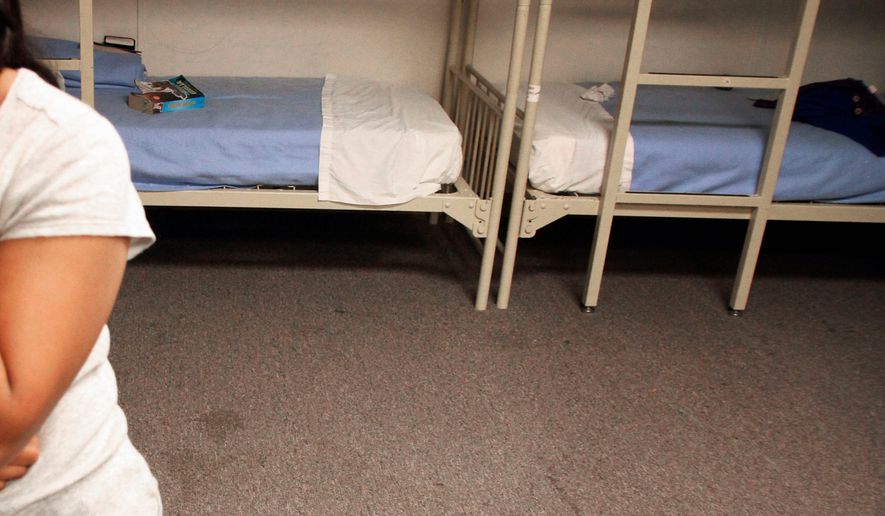Nearly 30 percent of the illegal immigrant children the U.S. is currently holding in its secure dormitories have ties to criminal gangs, the government revealed Wednesday, suggesting the Obama-era surge of Central Americans has fed the country’s growing problem with MS-13 and other gangs.
Federal officials refused even to guess at the true scope of the problem, telling the Senate Judiciary Committee that they can give only small snapshots of what they see. But they said the devastation on communities across the country is clear: killings and chaos, particularly among other immigrants — both legal and illegal.
The Border Patrol identified 160 teens who were known or suspected gang members when they first showed up at the border, but whom the Obama administration said it had to admit under U.S. law.
“It is well-known that MS-13 actively targets and recruits children as young as 8 years old,” said Sen. Chuck Grassley, the Iowa Republican and chairman of the Judiciary Committee who called Wednesday’s hearing.
“While their illegal status and Central American heritage are a key factor in MS-13’s targeting, without a doubt the failures of the current system for handling these children is also to blame,” he said. “The current system is fraught with abuse, systematic errors and a lack of effective cooperation.”
He was stunned that no agency could say how many “UAC,” as the government dubs unaccompanied alien children, have been recruited.
The agencies point to one another and to federal laws, saying their hands are tied.
UACs are usually arrested by the Border Patrol, which is required to turn them over to the social workers at HHS within 72 hours, ending the Border Patrol’s involvement. HHS says that under the law it must try to place the children with sponsors. Other than limited circumstances, the department says, its involvement ends soon after it sends the children off.
U.S. Immigration and Customs Enforcement doesn’t get involved until a UAC is ordered deported.
That usually leaves the children with no federal supervisions once they are released to sponsors — where they are often prime recruiting targets.
Scott Lloyd, director of the HHS office that handles UAC, said his team is looking to increase monitoring of the minors and is reviewing Obama administration interpretations of policy.
He also said the population of children has dropped dramatically under the Trump administration, as stiffer interior enforcement and tough talk from the president have discouraged children — and indeed all migrants — from attempting to cross the border.
That still leaves a large presence in the U.S., and MS-13 — with roots in El Salvador — is a growing threat, authorities said.
Officials said MS-13 is involved in some drug dealing and does engage in human trafficking, but its real money-making operation is extortion. The gang threatens families — including American citizens — with violence against relatives back in Central America unless those in the U.S. pay them off.
Gang members in the U.S. take directions directly from gang commanders in El Salvador, authorities say.
Kenneth A. Blanco, acting assistant attorney general in the criminal division at the Justice Department, also said immigrants who fail to report crimes to local police are often not afraid of being deported by federal authorities, but rather fear retaliation from the gang members and other criminals who live in their neighborhoods.
He said witnesses’ names become public, making them targets for retribution.
“That really, in my 28 years, has been the fear they have of calling the police. Not so much the other way around,” he said. “They’re really scared of these people.”
That runs counter to the argument made by Democrats and some local police chiefs that illegal immigrants refuse to report crimes because they fear entanglement with federal deportation agents.
Democrats pointed to calculations by some police agencies that crime reporting among Hispanics has dropped dramatically in the months since President Trump took office.
The Democrats say that is one justification for sanctuary city policies — though Sen. Richard J. Durbin, Illinois Democrat, offered another one Wednesday. He said Chicago, which in 2011 pioneered blanket sanctuary policies, doesn’t want to protect illegal immigrants but is too poor to assist federal agents.
“Come on, Uncle Sam, where’s the money?” Mr. Durbin said.
He said Chicago and Cook County are eager to keep serious criminals and other gang members out of their communities but added that it’s up to the federal government to fund the training he said local authorities need.
“Please help us. Send us some resources,” he said.
Federal officials, though, said they are not looking for locals to do the job, but rather to allow federal officers into their facilities and to share information about releases.
“We’re asking for their cooperation,” said Matthew Albence, executive associate director of enforcement and removal operations at U.S. Immigration and Customs Enforcement.
Mr. Albence singled out the Chicago area as one of the most prominent sanctuaries. “Chicago is a large one. We haven’t been able to get into the Cook County Jail for a long time,” he said.
He also named New York City and San Francisco as top sanctuary cities.
The conversation sprang from questioning by Sen. John Kennedy, Louisiana Republican, who asked about MS-13 and other gang members who are nabbed by local authorities in sanctuary cities.
“These are evil people. It’s pretty hard to miss them. There are tattoos all over their body,” Mr. Kennedy said. “If they’re arrested and they’re in a local jail, there are some cities in the United States that would prevent you from coming in and talking to them?”
“Correct,” Mr. Albence replied.
“We know who they are, we know they’re gang members, we know they’re criminals. But if the city, the county, doesn’t allow us to get into that jail then they’re released back into the community,” he said.
• Stephen Dinan can be reached at sdinan@washingtontimes.com.




Please read our comment policy before commenting.